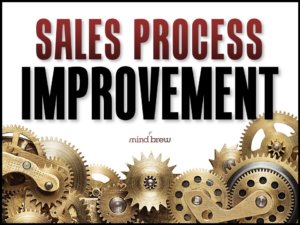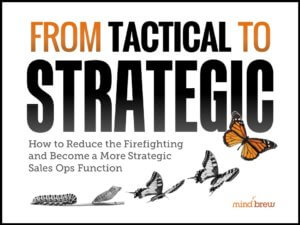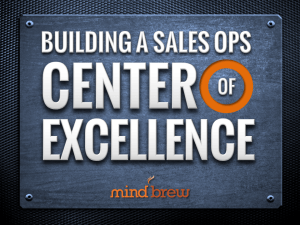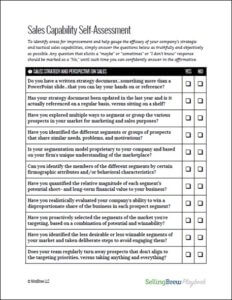If you’ve spent very much time on the SellingBrew site, you already know that we encourage sales ops teams to focus on making process improvements rather than focusing on one-off projects. By improving your processes, you can help the entire team become more productive over the long term.
But which processes should you tackle first?
To answer that question, you need to understand that your sales processes fall into two different categories:
- Strategic processes affect the quality of the decisions your team is making and the deals you are pursuing. These processes are all about thinking. Examples include whitespace analytics, prospect modeling, sales segmentation, customer research, negotiation training, etc.
- Tactical processes facilitate the capture, movement, and modification of data and documents. These processes are all about mechanics. Examples might be quoting and order entry, updating CRM records, exception and approval routing, sales contract management, and so on.
A lot of teams want to start by improving their tactical processes. For example, maybe they are going through the pricing exception process frequently, and it takes too long, resulting in lost deals. So they naturally want to find ways to speed up this process.
The problem is that these sorts of tactical process problems usually result from deficient strategic processes.
In our pricing exception example, there’s probably an underlying reason why the team needs to handle exceptions so often. Maybe your pricing segmentation isn’t granular enough. Or maybe your team needs better negotiating training.
Sure, you could maybe shave a day off the pricing exception process. And maybe that would make help you win a little more business. But more often than not, trying to manage a tactical process that is overly complex because of a lack of strategic work results in a vicious cycle that just creates more and more tactical work.
However, if you focus instead on the underlying cause and improve the strategic process — in this case, either your pricing segmentation or your training plan — you won’t need to use that exception process nearly as often. You’ll have made your team a lot more effective, not just more efficient.
Tactical process improvements can help you do things better. But a strategic process improvement will help you do better things. And often that strategic work will result in much bigger performance gains for the business.
Of course, sometimes you have a really inefficient tactical process that needs to be modernized or digitized or streamlined. We’re not saying that you should never tackle these improvements. We’re just saying that you want to focus the bulk of your effort where the payoff will be the biggest — and that’s on the strategic work.
We cover this idea in more depth in the Sales Process Improvement webinar. And if you’re interested in becoming more strategic, you might also want to check out From Tactical to Strategic Sales Ops.
Process improvement is a powerful tool. And by focusing that tool in the right place, you can maximize the benefit for your organization.












